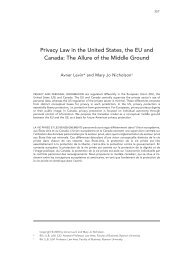Commentary on Fichte's “The Illegality of the Unauthorised ... - uoltj
Commentary on Fichte's “The Illegality of the Unauthorised ... - uoltj
Commentary on Fichte's “The Illegality of the Unauthorised ... - uoltj
You also want an ePaper? Increase the reach of your titles
YUMPU automatically turns print PDFs into web optimized ePapers that Google loves.
(2008) 5:1&2 UOLTJ 141<br />
<str<strong>on</strong>g>Commentary</str<strong>on</strong>g> <strong>on</strong> Fichte 167<br />
When it comes to applying this intersubjective c<strong>on</strong>cepti<strong>on</strong> <strong>of</strong> rights to<br />
property, Fichte takes a somewhat different approach than Kant. The difference<br />
is that Kant does not entitle <strong>the</strong> individual to a particular amount <strong>of</strong> property<br />
bey<strong>on</strong>d <strong>the</strong> minimum necessary for sustenance, 114 while Fichte does. I will now<br />
explain briefly how Fichte c<strong>on</strong>cludes that each individual is entitled to property,<br />
and <strong>the</strong>n I will develop <strong>the</strong> c<strong>on</strong>sequences for intellectual property.<br />
Fichte c<strong>on</strong>ceives <strong>of</strong> property as “that part <strong>of</strong> <strong>the</strong> sensible world that<br />
is known to me and subjected to my ends – even if <strong>on</strong>ly in thought.” 115 As<br />
Jean-Christophe Merle points out, <strong>the</strong> additi<strong>on</strong> <strong>of</strong> “even if <strong>on</strong>ly in my thoughts” 116<br />
emphasizes <strong>the</strong> fact that physical possessi<strong>on</strong> is not a pre-requisite <strong>of</strong> acquiring<br />
property. 117 The result is that, for Fichte, a property right extends to a thing as<br />
l<strong>on</strong>g as it falls within <strong>the</strong> sphere <strong>of</strong> <strong>the</strong> individual. Fur<strong>the</strong>rmore, it is possible that<br />
<strong>the</strong> same physical object can be possessed by many people in comm<strong>on</strong>, as l<strong>on</strong>g<br />
as <strong>the</strong> uses to which each puts <strong>the</strong> object are not inc<strong>on</strong>sistent with <strong>the</strong> use to<br />
which o<strong>the</strong>rs would put it. 118 Given that <strong>the</strong> influence <strong>of</strong> each pers<strong>on</strong> extends<br />
itself potentially (and in many cases, actually) across all things in <strong>the</strong> world, <strong>the</strong>n<br />
<strong>the</strong> distributi<strong>on</strong> <strong>of</strong> property potentially affects <strong>the</strong> freedom <strong>of</strong> all individuals. Or<br />
as Merle puts it, for Fichte, property rights are a part <strong>of</strong> distributive justice, and<br />
<strong>the</strong> regime <strong>of</strong> property implicates <strong>the</strong> just distributi<strong>on</strong> <strong>of</strong> this property. 119<br />
What is <strong>the</strong> principle <strong>on</strong> <strong>the</strong> basis <strong>of</strong> which property is to be distributed?<br />
Modern <strong>the</strong>ories <strong>of</strong> distributive justice <strong>of</strong>ten depend <strong>on</strong> a principle <strong>of</strong> equality.<br />
Fichte defines property <strong>on</strong> <strong>the</strong> basis <strong>of</strong> <strong>the</strong> individual using an object for a particular<br />
purpose. For c<strong>on</strong>temporary liberal <strong>the</strong>orists, this purpose is not predetermined;<br />
<strong>the</strong> individual is free to choose her own ends. But for Fichte, <strong>on</strong>ly those ends<br />
are to be taken into account that all humans pursue. 120 For him, <strong>the</strong> end that all<br />
humans pursue is to live (i.e. survive). In Fichte’s words, “[t]o be able to live is<br />
<strong>the</strong> absolute, inalienable property <strong>of</strong> all human beings.” 121 Since <strong>the</strong> individual’s<br />
labour is <strong>the</strong> means by which <strong>the</strong> individual gains what is necessary to live, it is<br />
<strong>the</strong> obligati<strong>on</strong> <strong>of</strong> <strong>the</strong> state to ensure that it is possible for <strong>the</strong> individual to live<br />
from her labour. As Fichte points out, “all have promised [in <strong>the</strong> civil c<strong>on</strong>tract] that<br />
<strong>the</strong>ir labor really ought to be <strong>the</strong> means for attaining this end [i.e. living], and <strong>the</strong><br />
state must make arrangements to insure this.” 122 This means that “if some<strong>on</strong>e is<br />
unable to make a living from his labor, he has not been given what is absolutely<br />
his.” 123 Two c<strong>on</strong>sequences follow from this. The first is that <strong>the</strong> individual must<br />
be provided with <strong>the</strong> means to live if she is not able to live by her labour. The<br />
sec<strong>on</strong>d is that if a certain type <strong>of</strong> labour is recognised as valuable in a society,<br />
<strong>the</strong>n <strong>the</strong> government has an obligati<strong>on</strong> to ensure that <strong>the</strong> individual can make a<br />
living through her chosen type <strong>of</strong> labour.<br />
The latter c<strong>on</strong>cept is, as we have seen, active in Fichte’s early essay <strong>on</strong><br />
114. Weinrib, “Poverty and Property in Kant’s System <strong>of</strong> Rights,” supra note 50.<br />
115. Fichte, Foundati<strong>on</strong>s <strong>of</strong> Natural Right, supra note 1 at 106; Fichte, Grundlage des Naturrechts, supra note 83<br />
at p. 116. The original reads: “den mir bekannten, und meinen Zwecken, sei es auch nur in Gedanken,<br />
unterworfenen Teil der Sinnenwelt . . . .”<br />
116. Merle, “Eigentumsrecht,” supra note 107 at p. 163.<br />
117. Merle, “Eigentumsrecht,” supra note 107 at p. 163.<br />
118. Merle, “Eigentumsrecht,” supra note 107 at p. 164.<br />
119. Merle, “Eigentumsrecht,” supra note 107 at pp. 165, 172.<br />
120. Merle, “Eigentumsrecht,” supra note 107 at p. 167.<br />
121. Fichte, Foundati<strong>on</strong>s <strong>of</strong> Natural Right, supra note 1 at p. 185.<br />
122. Fichte, Foundati<strong>on</strong>s <strong>of</strong> Natural Right, supra note 1 at p. 185.<br />
123. Fichte, Foundati<strong>on</strong>s <strong>of</strong> Natural Right, supra note 1 at p. 185.









